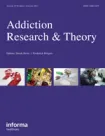| Titre : | Drinking context and problematic alcohol consumption in young Swedish women (2013) |
| Auteurs : | C. ANDERSSON ; V. SUNDH ; M. WAERN ; A. JAKOBSSON ; L. LISSNER ; F. SPAK |
| Type de document : | Article : Périodique |
| Dans : | Addiction Research and Theory (Vol.21, n°6, December 2013) |
| Article en page(s) : | 457-468 |
| Langues: | Anglais |
| Discipline : | SHS (Sciences humaines et sociales / Humanities and social sciences) |
| Mots-clés : |
Thésaurus géographique SUEDEThésaurus mots-clés SEXE FEMININ ; ALCOOL ; USAGE PROBLEMATIQUE ; JEUNE ADULTE ; TYPE D'USAGE ; ETUDE TRANSVERSALE ; COHORTE |
| Résumé : | Previous research has indicated that a variety of contextual factors are involved in the development of drinking behavior. An integrated perspective can extend our understanding of the context and circumstances in which individuals drink. In this study, a person-oriented approach, cluster analysis, was used to identify drinking context clusters in a population of 20- and 25-year-old Swedish women. A further aim was to analyze how these clusters were associated with problematic alcohol consumption (high episodic drinking (HED) and alcohol use disorder (AUD)). A total of 760 respondents were interviewed, some in 1996 and some in 2001. Self-reported effects of drinking and situational factors associated with drinking alcohol were used in the cluster analysis procedure. Logistic regression models were used to analyze the associations with problematic alcohol consumption. The results revealed four distinct clusters of drinking patterns: coping drinkers, social drinkers, controlled drinkers, and moderate drinkers. Differences between clusters concerning problematic alcohol consumption were found. HED was significantly more common among the social drinkers and alcohol use disorder was more prevalent among the coping drinkers. Age differences and to a lesser extent secular trends in drinking pattern could be observed. The findings suggest that information on drinking context can help to explain differences in patterns of risky drinking and AUD. This highlights the importance of identifying groups of individuals with potentially harmful drinking patterns, which could be the target of specific preventive actions. |
| Domaine : | Alcool / Alcohol |
| Affiliation : | Department of Public Health and Community Medicine, Social Medicine, The Sahlgrenska Academy at University of Gothenburg, Gothenburg, Sweden |
| Cote : | Abonnement |
| Lien : | http://dx.doi.org/10.3109/16066359.2012.746317 |
 Accueil
Accueil



